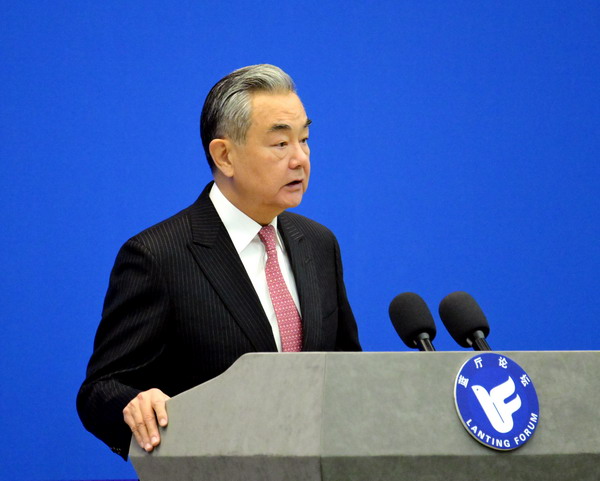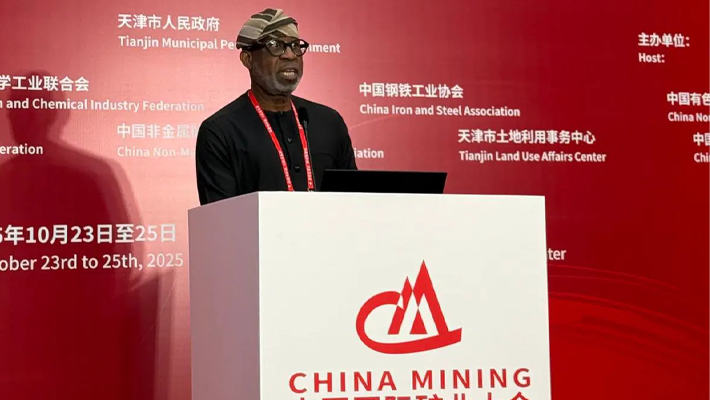Remarks by H.E. Wang Yi
Member of the Political Bureau of the CPC Central Committee
And Foreign Minister of the People’s Republic of China
At the 23rd Lanting Forum
Beijing, October 27, 2025
Distinguished Guests,
Diplomatic Envoys,
Friends,
Good morning! It is my great pleasure to join you at the Lanting Forum in discussing how to improve global governance, expand solidarity and cooperation, and advance together toward a community with a shared future for humanity.
A few days ago, we just celebrated the United Nations Day. Over the past 80 years, the international system with the U.N. at its core has been standing as a bedrock of world peace and development, and the idea of multilateralism has taken deep root in the heart of the people. Yet 80 years later today, the dregs of unilateralism are stirring up again, and global challenges are emerging one after another. How to reform and improve global governance to make it more relevant in the forthcoming multipolar world? That is a consequential question occupying minds everywhere.
Last month, President Xi Jinping solemnly put forth the Global Governance Initiative (GGI), offering the Chinese answer to this question of our times. This major initiative features and advocates five core concepts: First, sovereign equality to ensure participation in global affairs by all countries; Second, international rule of law for a just and orderly global governance system; Third, multilateralism for greater solidarity and cooperation among all countries; Fourth, a people-centered approach for universally beneficial and inclusive outcomes of global governance; Fifth, real results for a pragmatic and efficient global governance process.
The GGI builds on the purposes and principles of the U.N. Charter, reflects the fine tradition of Chinese diplomacy, upholds the vision of a shared future, and sets out the principles, methods and paths to reform and improve global governance. It represents a creative advancement and elevation of our understanding of global governance as well as a breakthrough of theories of traditional international relations. It is a new major global public good contributed by China.
The GGI responds to the needs of the world and wishes of the people. Together with the Global Development Initiative (GDI), the Global Security Initiative (GSI) and the Global Civilization Initiative (GCI), it promises much needed stability and provides certainty for this volatile world, and has received swift and clear support from more than 140 countries and international organizations. The international community believes that the Initiative is a timely call for solidarity in a world threatened by fragmentation, it holds up critical pillars when the U.N. foundation is being eroded, and it explicitly advocates togetherness instead of dominance as a rule of global governance. It believes the GGI represents the maximum commonality of all countries, it is a key measure to tackle global challenges and defend multilateralism, and that it is a critical step toward a more just and equitable world.
The most unequivocal message from the GGI is a call for stronger solidarity. The world today is witnessing more than 50 ongoing conflicts of various types, with over 100 million people displaced. Such a world, marked by transformation and turbulence, is in greater need of enhanced global governance than ever before. Blind worship of might, power politics and bullying will only push the world back to the law of the jungle, and seriously undermine the foundation of the international system and rules. President Xi Jinping’s timely proposal of the GGI has sent a strong message that countries must come together to meet challenges, forging a consensus and a force for solidarity and cooperation to overcome division and confrontation.
The GGI represents a most powerful statement of multilateralism. Multilateralism is the cornerstone of the current international order, and more importantly, the path that promises peace and development. Yet, it is faced with unprecedented challenges by willful acts that seek to abandon international organizations and agreements and to forge exclusive blocs. But the trend of history is irreversible, and a multipolar world is dawning. As advocated by the GGI, global affairs should be discussed by all, the global governance system built by all, and the governance outcomes shared by all. All acts of unilateralism must be rejected. This position reflects the trend of our times and the aspirations of the overwhelming majority of countries. It will boost the confidence and determination of the international community to practice multilateralism and enhance multilateral mechanisms.
The most desired vision of the GGI is a future of fairness. It aims to make the global governance system more just and equitable and bring all together toward a community with a shared future for humanity. It calls for greater representation and voice for developing countries, and rejects bullying of the small and weak. It calls for equal and uniform application of international law and rules, and opposes imposing one’s own house rules on others. It calls for closing the North-South gap as soon as possible and better upholding the common interests of all countries. It calls on developed countries to earnestly fulfill their responsibilities and developing countries to seek strength through unity. The GGI shows not only the direction of global governance, but also the right path to get there. It will help safeguard the legitimate rights and interests of Global South countries and fundamentally rectify historical injustice.
Friends,
Vision lights up the path ahead, and cooperation opens up a better future. China is ready to work with all parties to put the GGI into action. We will engage consistently in equal consultation, listen to different views, and take useful advice with an open mind to build maximum consensus. We will base our creativity on past achievement, and make timely changes to reform and improve, rather than replace, the current international system. We will promote global governance reform with gradual and sustained effort to make it beneficial to the whole world. To this end, we should take the following actions.
First, we should jointly uphold the authority and status of the U.N. to cement the foundation of global governance. The U.N.-centered international system has always been an important underpinning for human progress. It must be strengthened, not weakened. Failure to honor the purposes and principles of the U.N. Charter has led to the multitude of problems we face today. All countries should uphold the U.N. Charter and the basic norms governing international relations and fulfill international obligations in their entirety and in good faith. International rules should not be applied selectively according to one’s own interests. No one should be allowed to cripple the United Nations. Greater democracy and rule of law in international relations is an unstoppable process. As long as we stay determined and united, the U.N. will overcome difficulties and reinvigorate its authority and vitality.
China supports the U.N. consistently and firmly. We have held a solemn commemoration of the 80th anniversary of the victory of the Chinese People’s War of Resistance Against Japanese Aggression and the World Anti-Fascist War to uphold the outcomes of World War II and the post-war international order and safeguard international fairness and justice. The success of the Global Leaders’ Meeting on Women is China’s concrete action to empower the global women’s cause. We have announced the decision to set up a China-U.N. Global South-South Development Facility and establish in Shanghai a global center for sustainable development in partnership with the U.N. Development Program to speed up the implementation of the 2030 Agenda for Sustainable Development. We call on all countries to engage with the U.N. on the cooperation agendas across poverty reduction, infrastructure, education and health. The U.N.80 Initiative has reached a critical stage where member states are in consultation for its advancement. China supports the U.N. reform effort and will work with all countries to step up support for the U.N. system.
Second, we should work together to advance common development to enhance the efficacy of global governance. International trade is a key engine for world economic growth. A WTO that plays its due role to safeguard an open and inclusive trade environment meets the fundamental interests of all sides. China has announced that while remaining a developing country, it will not seek new special and differential treatment in current and future negotiations at the WTO. This concrete action by China is a vote of confidence in the multilateral trading system. We call for an end to politicizing economic and trade issues, to fragmenting the global market, and to reckless decisions to wage trade and tariff wars.
Today, international cooperation on development is losing steam, and the North-South gap is widening. We should put development back at the center of international agenda, mobilize global resources for development, and foster an equal and balanced global development partnership. China has been advancing high-quality Belt and Road cooperation with partner countries, benefiting over three-fourths of all countries in the world. We have implemented the 10 partnership actions for modernization with African countries, carried out five programs with Latin American and Caribbean countries, developed five cooperation frameworks with Arab states, and built seven cooperation platforms tailored to Pacific Island countries, bringing about shared progress on our paths toward modernization. China will open its door ever wider. We will fully deliver on the zero-tariff treatment for 100 percent tariff lines given to least developed countries having diplomatic relations with China and African countries, so as to share development opportunities with more countries and peoples.
Third, we should stand together to tackle pressing challenges and shore up the weak links in global governance. This year marks the 10th anniversary of the Paris Agreement. Climate change has become a pressing challenge. On tackling climate change, no country should lag behind, and none should shirk its responsibility. Developed countries must earnestly fulfill their emission reduction commitments, and provide financial and technological support to developing countries. China stands ready to play an important role, honor its words with concrete actions and strive to do its utmost within its capability. Recently, President Xi has announced China’s new Nationally Determined Contributions, which reflects China’s uttermost efforts based on the requirements of the Paris Agreement. We are ready to work more closely with the international community on green technologies and industries and stay on the right track toward green transition.
Science and technology is advancing at an unprecedented pace, and global governance needs to keep up with the times. Artificial intelligence should benefit all humanity; it should neither be monopolized by a few countries nor be maliciously abused. China supports the U.N., as the main channel in global AI governance, in guiding countries to strengthen the alignment of AI development strategies, governance rules and technical standards, so as to form a governance framework and standards with broad consensus. China is actively implementing the Global AI Governance Initiative, and has initiated the World AI Cooperation Organization (WAICO), to advance AI for good and for all and support capacity building in Global South countries. We welcome the active participation of all countries in these efforts.
Building a world of universal and common security is an inherent responsibility of the international community. While we welcome the first-phase agreement on the Gaza conflict, and the humanitarian disaster has finally been eased, peace there remains very fragile. China calls for a genuine, comprehensive and lasting ceasefire, and the implementation of “the Palestinians governing Palestine” principle as well as the two-State solution for the purpose of lasting peace and stability in the Middle East. Meanwhile, the Ukraine crisis continues to persist. China holds an objective and just position, actively promotes peace talks, and stands ready to work with the international community to continue the efforts for peace.
Fourth, we should actively respond to the aspirations of the Global South and improve the global governance architecture. The Global South is rising as a whole. Making sure that developing countries equally take part in major global governance decision-making is key to just and effective governance. We believe that when making international rules, the voice of the Global South must be heard thoroughly, their presence expanded, and their legitimate rights and interests protected.
The reform process of the international financial system gravely lags behind, failing to reflect major shifts in the world economic landscape. We support advancing the realignment of IMF quota shares and shareholding review at the World Bank according to the agreed timeframe and roadmap, so as to promptly address the democratic deficit in global economic and financial governance. We support the Asian Infrastructure Investment Bank and the New Development Bank in playing a greater role as useful complements to existing financial institutions, jointly contributing to global financial stability.
In the face of major crises and conflicts, the U.N. Security Council has not been able to effectively respond to the expectations of the international community. As a permanent member of the U.N. Security Council, China firmly supports the reform of the Council. Upholding the right direction of this reform means to increase the representation and voice of developing countries. The pressing task is to make special arrangements to meet Africa’s aspiration as a priority.
China believes that the Global South not only has the will and the right but also the capacity to be a pivotal force in global governance reform. Looking forward, global governance will enter the “Global South Time.” South Africa, Brazil and Qatar will host respectively the G20 Summit, the U.N. Climate Change Conference (COP30), and the World Summit for Social Development. China will render full support to Global South countries in hosting these meetings, advancing the collective contributions of the Global South to global governance.
Fifth, we should fully leverage the roles of diverse stakeholders and pool strength for global governance. Regional cooperation mechanisms and specialized platforms are flourishing as a vital new force in global governance. China will soon assume the rotating presidency of APEC 2026. We look forward to working with all sides to advance the building of an Asia-Pacific community and a Free Trade Area of the Asia-Pacific, paving the way for greater development in the region. The BRICS cooperation mechanism, with its growing representation, has become the most important platform for solidarity and cooperation of emerging markets and developing countries. China firmly supports the high-quality development of greater BRICS cooperation, with fairness, justice, openness and inclusiveness as its guiding principles in advancing global governance reform. Embracing the Shanghai Spirit, the Shanghai Cooperation Organization (SCO) is increasingly becoming a strong driving force in global governance development and reform. China supports the SCO in expanding cooperation with the U.N. and other multilateral mechanisms to jointly improve global and regional governance.
A few days ago, the International Organization for Mediation (IOMed) was inaugurated in the Hong Kong Special Administrative Region of China. It is the world’s first intergovernmental legal organization dedicated to resolving international disputes through mediation, and represents a new type of global public good provided by China together with the founding members. We welcome more countries to join the IOMed and seek to resolve differences, promote reconciliation and safeguard peace on this platform.
Friends,
The just-concluded Fourth Plenary Session of the 20th CPC Central Committee proposed recommendations for China’s 15th Five-Year Plan. It charts a grand blueprint for China’s economic and social development in the next five years, as well as a promising vision for win-win cooperation between China and the rest of the world. It was stressed at the session that China should promote high-standard opening up, create new horizons for mutually beneficial cooperation, and secure further progress in building a community with a shared future for humanity. A China steadily advancing modernization will undoubtedly create vast opportunities for the common development of the world. A China dedicated to the noble cause of peace and development will demonstrate even greater responsibility in advancing human progress. We stand ready to work with the international community, fully deliver the Global Governance Initiative, build a more just and equitable global governance system, and jointly usher in a brighter tomorrow for humanity.
Thank you.





